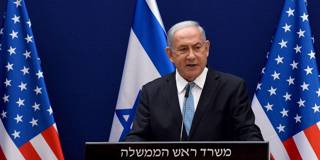It is highly probable that more Arab countries will, like Bahrain, follow in the footsteps of the United Arab Emirates and normalize relations with Israel. Once the supposed epicenter of the region’s worries, Palestine has become a disposable cause.
TEL AVIV – Israeli Prime Minister Binyamin Netanyahu has hailed the agreement normalizing relations between Israel and the United Arab Emirates – which the two countries will sign at a White House ceremony on September 15 – as a historic step that equals Israel’s previous peace deals with Egypt and Jordan. The Israeli leader also boasted that the agreement with the UAE vindicated his “Netanyahu doctrine” of peace for peace, rather than land for peace.
But even peace with a country with which Israel does not share a border and has never fought a war required Netanyahu to give up his plans to annex large parts of the West Bank. So, there was a “land for peace” aspect to the deal after all.
More important, Netanyahu’s “doctrine” practically buries the concept underlying the 2002 Arab Peace Initiative: that an Israeli-Palestinian peace should be the precondition for normalization of Arab states’ relations with Israel. The Arab League itself has rejected the Palestinians’ request to condemn the Israel-UAE deal, and the pact also signals the defeat of the Israeli left’s vision of Palestine as the key to peace with the Arab world.

TEL AVIV – Israeli Prime Minister Binyamin Netanyahu has hailed the agreement normalizing relations between Israel and the United Arab Emirates – which the two countries will sign at a White House ceremony on September 15 – as a historic step that equals Israel’s previous peace deals with Egypt and Jordan. The Israeli leader also boasted that the agreement with the UAE vindicated his “Netanyahu doctrine” of peace for peace, rather than land for peace.
But even peace with a country with which Israel does not share a border and has never fought a war required Netanyahu to give up his plans to annex large parts of the West Bank. So, there was a “land for peace” aspect to the deal after all.
More important, Netanyahu’s “doctrine” practically buries the concept underlying the 2002 Arab Peace Initiative: that an Israeli-Palestinian peace should be the precondition for normalization of Arab states’ relations with Israel. The Arab League itself has rejected the Palestinians’ request to condemn the Israel-UAE deal, and the pact also signals the defeat of the Israeli left’s vision of Palestine as the key to peace with the Arab world.